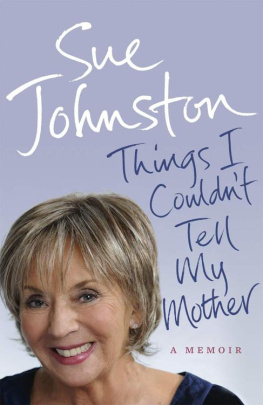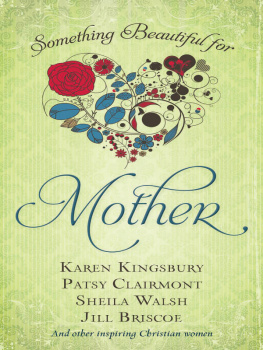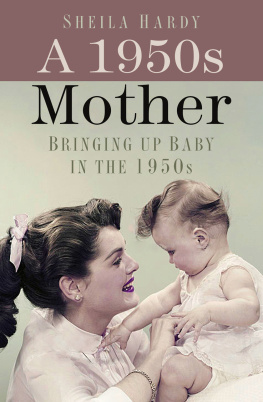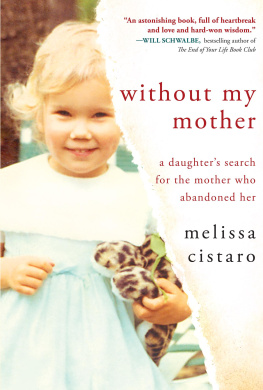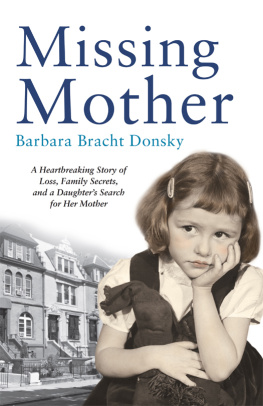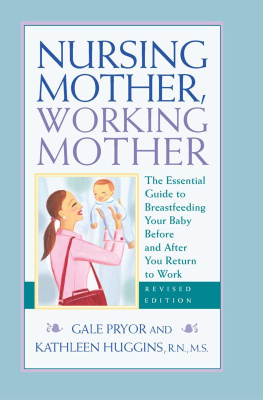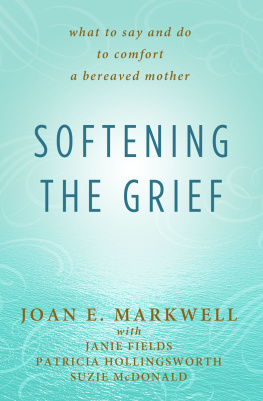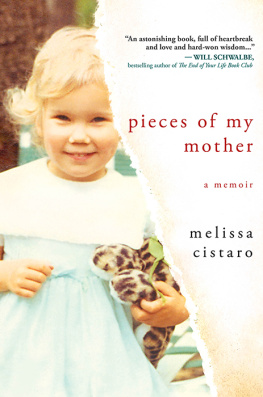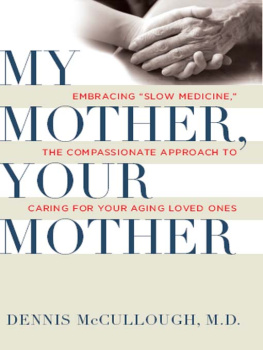Contents
About the Book
There was a lot that we kept from my mother. My dad would say to me as a teenager Dont tell your mother. We couldnt face the disapproval.
Sue Johnston always seemed to be disappointing her mother. As a girl she never stayed clean and tidy like her cousins. As she grew older, she spent all her piano lesson money on drinks for her mates down the pub, and when she discovered the Cavern she was never at home. The final straw was when Sue left her steady job at a St Helens factory to try her hand at that unsteadiest of jobs: acting.
Yet when Sue was bringing up her own child alone, her mother was always there to help. And playing her much-loved characters Sheila Grant and Barbara Royle although her mum wouldnt say she was proud as such, she certainly seemed to approve. And in her mothers final months, it was Sue she needed by her side.
The relationship with your mother is perhaps the most precious and fraught of any womans life. When she began writing, Sue set out to record all the big things, and all the small things. Everything I wanted to tell my mother but felt I never could. The result is a warm, poignant and often very funny memoir by one of Britains favourite actresses.
About the Author
Sue Johnstons many much-loved roles include Sheila Grant in Brookside , Barbara in The Royle Family , Sal Vine in Jam & Jerusalem and Dr Grace Foley in Waking the Dead . Born in 1943 in Warrington near Liverpool, Sue has stayed true to her Northern roots she has been no stranger to picket lines and is a staunch supporter of her beloved Liverpool Football Club. Sue has a son, Joel, and in 2009 she was awarded an OBE.
To my mum and dad .
And my son Joel who will never read it!
And Gemma who will .
This book is a work of non-fiction based on the life, experiences and recollections of the author. The names of some people, places, dates and sequences, or the details of the events, have been changed to protect the privacy of others.
Prologue
ENA SHARPLES ONCE famously said of her mothers death, She just sat up, broke wind and died. My mother would have definitely considered herself to be a cut above the fictitious Mrs Sharples and her mother. But as she lay in her bed, in the home where shed been living for the past year, she did make one last Herculean effort to sit up, reaching out to be helped. Then she sneezed, lay back in bed, and I felt the life leave her, like someone had flicked off a switch.
She was ninety-two. I was sixty-three. These were her final moments, but the preceding weeks and even months had been long and exhausting.
As I reflect now, nearly four years after her death, I miss her. This may seem unsurprising; of course I should miss my mother. But things were far from plain sailing between her and me; our relationship was often difficult and fraught.
*
My mother began to sharply decline when I was filming Waking the Dead . Any time that I wasnt filming I would be making my way up the M6 to be with her. Then I received a call early in September 2007 saying she had taken a turn for the worse and that I should get there as soon as I could.
When I arrived in Warrington my mother had rallied and was sitting up in bed, alert and ready for me. She looked me up and down in my on-screen make-up and asked scathingly, What have you come as? You look like a bus conductress.
This used to be quite a common insult when I was younger, as bus conductresses were known to wear thick pan-stick make-up. That Id arrived to see my mum for what I thought would be the last time, only to be greeted with this, really makes me smile now. It was so typical of her. I stayed with her for a while and then reluctantly returned to filming in London.
A few days later I had another call. The nurses said they were sure this time that this was it. On the way, I got a flat tyre but I didnt stop. I think that I knew this really was the last time I would be making the journey. Everything and nothing was going through my mind. I was very emotional racked with anxiety and upset, tired yet wired.
When I arrived at the home my mother was lying in bed, looking tiny and frail. There was no caustic put down this time. She just looked helpless and fragile. She was awake and aware that I was there but quiet and restful, slipping in and out of consciousness. I took her hand and vowed to stay by her side. I would remain there for the next four days.
This time to be with my mother was a privilege that I know many people arent afforded. And as fraught, surreal and sad as it was, I was mindful that I had the opportunity to say things to her that I might not have normally said. Over the years I have had more than one occasion to want to tell my mother exactly what I thought of her, and not all of it complimentary or pleasant. She had always been a difficult person to deal with someone who, Im sad to say, found it very difficult to show affection or warmth towards me. It seems strange to admit this and yet at the same time she was my mother and I still loved her. As close relationships in life often are, ours was complicated.
My mother was obsessed with the notion of people getting ideas above their station. Having a daughter who was educated and followed her own path in life definitely fit into this category. There were many times when I just wanted her to be proud of me, but it seemed she never was.
But in these, her final days, as she lay in bed and I sat in the chair next to her, I wouldnt go as far as to say that none of the things that made me angry about her didnt matter, but they certainly didnt need airing now. It seemed to me to be a time for peaceful acceptance. As she became more vulnerable I felt things soften between us. I suppose it was because she needed me and I was very happy to be needed and to help.
With all of this time to think, with nursing staff and relatives coming and going, but me as a constant in the room with my mother, I felt I needed to say something to her for her to hear something from me that was from my heart. Something I could say with absolute honesty.
I took her hand and said, Mum, I had the best childhood I could ever have had.
Tears sprang to her eyes. I held her hand, which was gnarled with arthritis but she had enough strength for me to feel that she was holding on to me. Things changed as I got older, but it was true I really did have the best childhood and I needed her to know that.
*
Since her death, I have realised that whatever age we are, we all feel like children at times, even when there may be no one there to be a child for. Only last week I found myself hovering near the phone: I had found a recipe that I knew my mother would have liked and I wanted to tell her about it. Grief seemed to hit me all over again when I knew I couldnt have that conversation. It was only a small thing but she would have been interested in my discovery and it made me very sad that I couldnt share it with her.
My aim with this book is to look back over my life and explore what it was I couldnt tell my mother, and why that was. But also and more importantly perhaps I want to set down a record of all the love and life, loss and laughs: all the big things, and the small things. Everything I wanted to tell my mother but felt I never could.
Chapter One
I WAS BORN in my aunty Millies house in Warrington during the Second World War. My mother Margaret was staying at Millies while my dad was away with his regiment. It is fitting that I was born in the thick of my extended family because although I was an only child I always felt part of a large clan.
My mother and her sisters would take turns to stay at each others houses. The reason they gave was to keep the houses aired. It seemed that everything needed airing in those days. No wonder youve got a cold, my mother would say, that tops not even aired! So the houses were occupied in rotation in order to keep them aired, but Im sure the real reason was the reassurance of safety in numbers.

